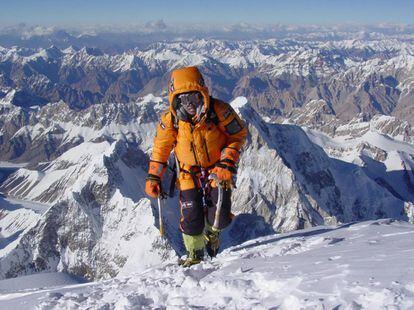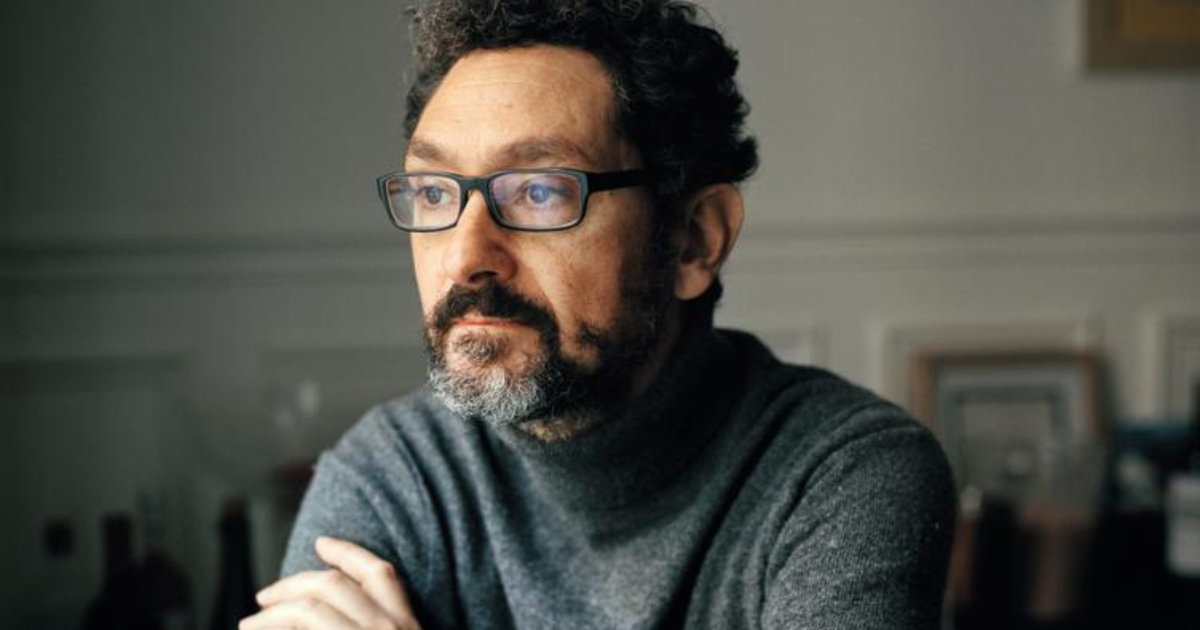There were higher peaks in the life of Edurne Pasabán (Tolosa, Gipuzkoa; 48 years old) than the 14 eight-thousanders she climbed, the first woman to crown them.
After overcoming a depression that led to her suicide attempt, the mountaineer today enjoys her five-year-old son Max and shares her experience of elite sport and mental health.
Ask.
Who is Edurne Pasabán today?
Response.
A girl who fought for her passion, climbing mountains, and who made her passion her life purpose.
Today I don't climb eight thousand, but the mountain is still in me.
What I learned I teach to others.
Q.
How has being a mother changed you?
R.
I am much more afraid.
I have lived many things and very to the extreme.
Before I didn't think if something could happen to me and now it does.
I would love to go to the Himalayas two months a year, but I am in a different stage of life.
Q.
Would you like your son to be a mountain climber?
R.
Selfishly, no.
I know the risk of what I have done and I do not want to suffer knowing that my son is there.
My parents did not know the volume of what we did and they let us go.
But I know and I don't want to suffer.
Although if he wants, I will support him.
Q.
What are you most proud of in your career?
R.
To be able to live from this.
It was a minority sport.
We gave more visibility to four linnets who were going to the mountain.
P.
Was being the first woman with 14 a wish, a challenge, a business...?
R.
There were stages.
At first I was a 24-year-old girl who has a dream, the Himalayas.
It was a story of adventure, of love.
Then it starts at the
edge of the impossible,
on TVE, and we became professional.
Until then I was looking for a living to find money and travel, without any help, selling t-shirts and Christmas tickets, something that the town council gave me for doing Everest... Then there came a point where I said that this was not a game.
Either he went forward or backwards.
I was becoming an adult.
In 2007 the project of the 14 eight thousand was created.
She had to sell that she was going to be the first woman to upload them, or she couldn't get sponsors.
There was already more pressure.
The responsibility in the backpack was loading.
She started a competition with an Italian, an Austrian and a Korean who had great resources.
My expedition spent 130,000 euros and his to Annapurna cost five million, with satellite, live TV... I had the same illusion as at the beginning.
Edurne Pasabán, on K2 in 2004.
Q.
Did you pay any tolls?
R.
I begin to earn a living with this at the age of 35, when an athlete in another discipline at that age has already retired.
When I become a professional, it is a difficult time for a woman, because at 31 or 32, society makes us feel that we have to find a partner and create a family.
I, on the other hand, spent seven months in the Himalayas risking my life.
And not only that, but my male colleagues could do it.
They had the photo of their children in the base camp.
That weighed me down.
Q.
Is your depression born there?
R.
Yes, it was in 2006. Everything is detonated because a partner left me.
And it has to do with combining one thing that I am passionate about with another that I wanted.
I fall into a hole and blame the mountain.
They told me: “How long do you go to the mountains, how are you going to have someone to put up with you…”.
It wasn't that the mountain overwhelmed me or the pressure of finishing 14. That year is the only one that I didn't get on an eight thousand, my battery runs out, I disconnect.
I had a lot of help in the family and in my people of the eight thousand.
They knew they had to convince me to come back.
P.
You did something that would be a dream for many...
R.
Yes, but when a person falls into a depression, even if they tell you that you have everything, in that hole you don't see anything.
In 2007 they organized an expedition to Broad Peak for me, we reached the summit and it was very beautiful.
My references have been my class friends, from all my life, with whom I talked about their husbands, their children... I went to a dinner and they only talked about that.
Some of them accompanied me in that base camp.
It was brutal.
Tears still come to my eyes.
They told me: "Stop fooling around, go up there."
And I changed the chip.
Q.
How do you get to the point of wanting to kill yourself twice?
R.
They were very hard times.
On Monday I turn 49.
It seems brutal to me.
Time goes by super fast and I don't want to have a birthday.
I have so many things I want to do that I don't have time.
I get older, I can't do things like before and it pisses me off.
I literally suck at getting older.
Thinking about this a few days ago, I went back to that 2006 and I said to myself: How have I tried to take my life saying that this is shit, that life is not worth living?
Thank you that didn't happen.
I am one of the lucky people for whom wanting to kill myself did not work, or I was not brave enough.
Lucky.
P.
Did you want his death or end the pain?
A.
End the pain.
It's so big you want to take it off and it's the only way.
If your leg hurts, you take an ibuprofen.
That pain of the soul, within you, is very difficult to remove and the ball is getting bigger.
Q.
You came to search on the Internet how to do it.
Doesn't that scare you now?
R.
People scares me, the situation that many people are experiencing today, going through the same thing I went through.
I'm not scared right now.
People who have experienced a mental illness can have the same thing again, but I know myself much more and I know that when the traffic light turns from green to amber, I have more knowledge of myself and I am calmer.
And this has already happened to me.
I'm not going to say that in the last 10 years I haven't had to go back on antidepressants.
When I have that anxiety or that anguish, I control it more.
That of trying to take my life now does not scare me, but everything I see outside does.
Q.
Your lowest point?
R.
Enter a psychiatric hospital.
Depression is still a taboo.
If they detect a tumor, I go to treat myself today.
But when you have a mental illness and you have to take that step, it's super hard.
Your family, your environment, you, society, does not accept it.
When they admit me, my brother makes my father stop the car saying how could they leave me in there.
And my mother stopped going for coffee in the mornings with her friends so as not to give explanations.
If I had had cancer and had undergone chemotherapy, I would not have done the same.
P.
Could you face an eight thousand but not real life?
A.
That's it.
Everybody told me.
I faced death every day in the Himalayas, I had lost many friends, five of us went on an expedition and four returned, but I could not structure my life and be happy.
I could see a friend die in the mountains, but I couldn't get over the fact that an uncle had left me, that my grandmother told me that I was going to miss the rice...
Q.
Does the athlete have to be invincible?
R.
That is, and it is not.
We are not invincible, we are real.
Q.
What message do you want to convey?
A.
Ask for help.
That is the great problem of our young people, who do not ask for help.
For fear of rejection, not.
Q.
What is your fifteenth eight thousand?
R.
The most difficult and the most important of all, my son Max.
I can forget the others, but this one is present every day.
What makes Edurne Pasabán happy today is not the 14 eight-thousanders she climbed, but Max.
Pasabán, on one of his expeditions to the Himalayas.
By helicopter from a hotel spa to Everest
The queues on Everest and K2 scare Edurne Pasabán, a symbol of a time when loneliness could be found in the mountains.
“Today it is a business.
When I see those traffic jams I think how lucky I am to have lived another time.
There was nobody there, just a wall to which we put 5,000 meters of rope.
Today those 145 people who climb K2 in one day are all crazy”.
Pasabán thinks about this mountaineering of records and overcrowding: “It is not the quantity, but the quality, the ethics.
We have seen the 14 eight-thousander climb in six months, but in that film you don't see that chaining Lhotse, Everest and Makalu is unfeasible if you don't use a helicopter, oxygen and a rope to the top.
It took me 10 days to get to base camp on foot.
Now you are in Camp 2 of Everest, at 6,500 meters, a helicopter takes you to the best five-star hotel in Kathmandu, you are in the spa in the afternoon and when you rest for four days it returns you to Camp 2. I remember spending four days with a girl with a broken hip, on a table, waiting for help”.
You can follow EL PAÍS Deportes on
and
, or sign up here to receive
our weekly newsletter
.







